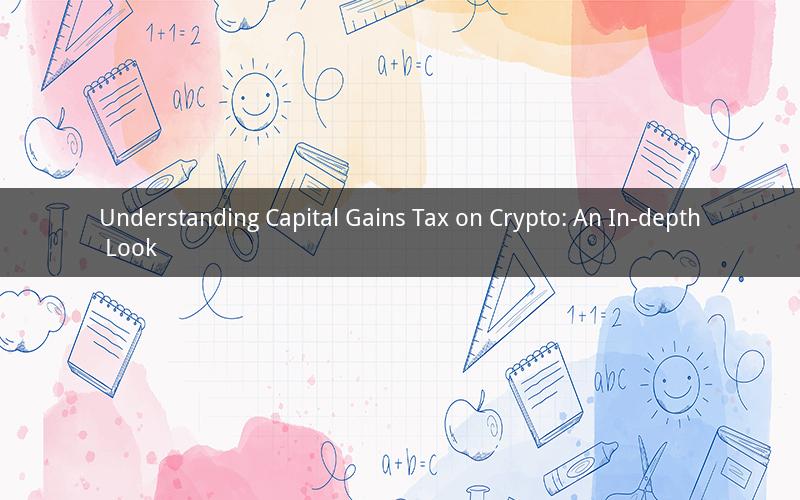
Introduction:
In recent years, cryptocurrencies have gained immense popularity as a new asset class. With this rise in popularity, questions about taxation have also emerged. One of the most frequently asked questions is about capital gains tax on crypto. This article aims to provide a comprehensive understanding of what capital gains tax on crypto is, how it works, and the implications for investors.
What is Capital Gains Tax on Crypto?
Capital gains tax on crypto refers to the tax imposed on the profit made from the sale or exchange of digital currencies. It is a form of income tax that investors must pay when they sell their crypto assets for a higher price than their original purchase price. The tax rate varies depending on the country and jurisdiction.
How Does Capital Gains Tax on Crypto Work?
The process of calculating and paying capital gains tax on crypto involves several steps:
1. Determining the Cost Basis: The cost basis of a crypto asset is the total amount invested in acquiring it, including the purchase price, transaction fees, and any other expenses related to the acquisition. This cost basis is used to calculate the capital gain or loss when the asset is sold.
2. Calculating the Capital Gain: The capital gain is the difference between the selling price of the crypto asset and its cost basis. If the selling price is higher than the cost basis, it results in a capital gain. Conversely, if the selling price is lower than the cost basis, it results in a capital loss.
3. Determining the Tax Rate: The tax rate for capital gains on crypto depends on the investor's overall income and the duration for which the asset was held. In some countries, short-term capital gains (assets held for less than a year) are taxed at a higher rate than long-term capital gains (assets held for more than a year).
4. Reporting and Paying Taxes: Investors must report their capital gains from crypto assets on their tax returns. The specific reporting requirements and tax payment methods vary depending on the country and jurisdiction.
5. Withholding Taxes: In some countries, the tax authority may require buyers to withhold a portion of the proceeds from the sale of crypto assets to ensure that the seller pays the required taxes. This is known as a withholding tax.
Implications for Investors
Understanding capital gains tax on crypto is crucial for investors for several reasons:
1. Financial Planning: By knowing the potential tax implications, investors can make informed decisions about their investment strategies and plan their finances accordingly.
2. Compliance: Failing to comply with capital gains tax requirements can result in penalties, fines, or even legal consequences. It is essential for investors to understand their tax obligations and fulfill them correctly.
3. Tax Efficiency: By understanding the tax rates and holding periods, investors can optimize their tax positions and potentially reduce their tax liability.
5 Questions and Answers:
1. Question: Can I avoid capital gains tax on crypto by holding it for a long period?
Answer: No, holding crypto for a long period does not exempt you from capital gains tax. The tax is determined based on the difference between the selling price and the cost basis, regardless of the holding period.
2. Question: Do I need to report capital gains from crypto to my tax authority?
Answer: Yes, you are required to report your capital gains from crypto assets to your tax authority. Failure to report can result in penalties and legal consequences.
3. Question: Can I deduct losses from crypto assets from my capital gains tax liability?
Answer: Yes, you can deduct capital losses from crypto assets from your capital gains tax liability. However, there may be limitations on the amount of losses you can deduct in a given year.
4. Question: How can I calculate the cost basis of my crypto assets?
Answer: The cost basis of your crypto assets can be calculated by adding the purchase price, transaction fees, and any other expenses related to acquiring the asset. Divide the total cost by the number of units you own to determine the cost basis per unit.
5. Question: Are there any tax benefits for investing in cryptocurrencies?
Answer: While there are no specific tax benefits for investing in cryptocurrencies, certain countries offer tax incentives for investments in digital assets. It is essential to consult with a tax professional or financial advisor to understand the tax implications and potential benefits in your specific jurisdiction.
Conclusion:
Understanding capital gains tax on crypto is crucial for investors to make informed decisions and comply with tax obligations. By following the steps outlined in this article, investors can navigate the complexities of capital gains tax on crypto and optimize their tax positions. It is always advisable to consult with a tax professional or financial advisor for personalized advice based on your specific circumstances.